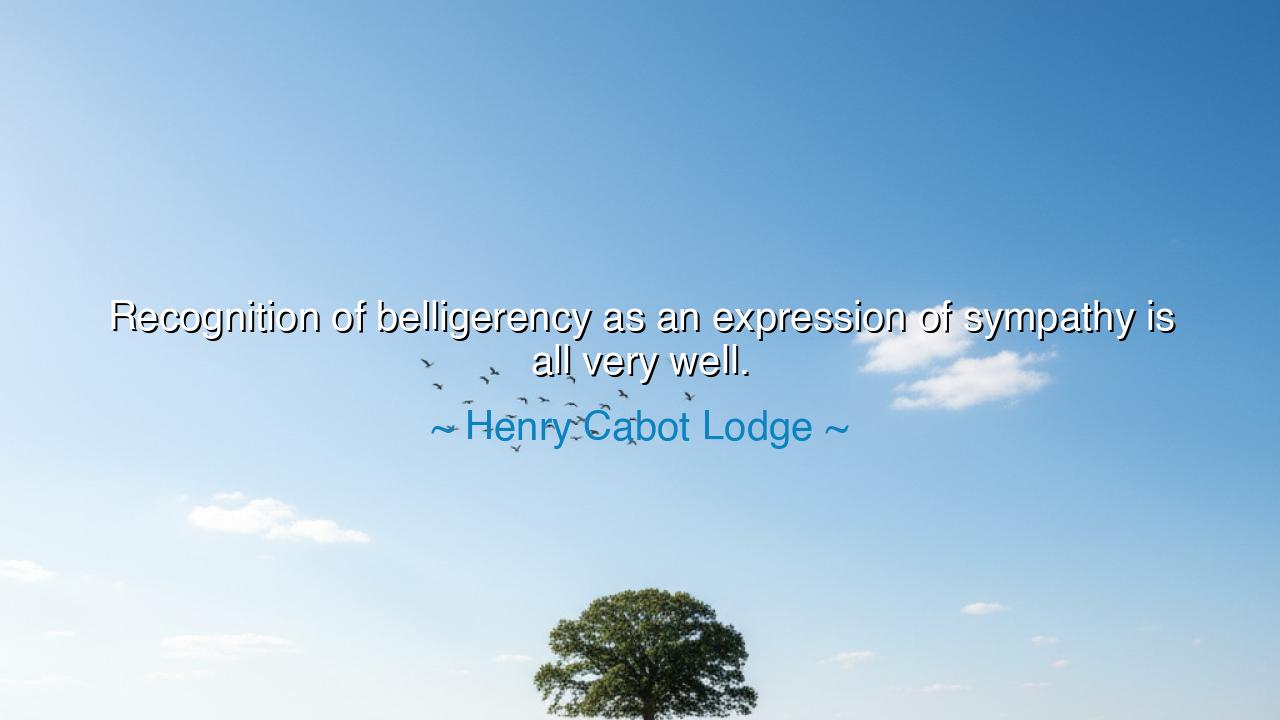
Recognition of belligerency as an expression of sympathy is all






Hear the words of Henry Cabot Lodge, statesman of America, who lived in an age when nations were tested by war and diplomacy. He declared: “Recognition of belligerency as an expression of sympathy is all very well.” These words are subtle yet profound, for they draw a line between sentiment and action, between the warmth of feeling and the cold calculus of statecraft. He reminds us that sympathy may stir the heart, but when translated into the recognition of belligerency—the legitimizing of one side in conflict—it carries consequences that echo far beyond compassion.
The origin of Lodge’s statement lies in the tumult of the nineteenth century, when civil wars and revolutions shook the world. To grant recognition of belligerency was not simply a gesture of kindness—it was a political act, conferring status upon rebels, revolutionaries, or secessionists. It was to say: “We see you not as outlaws, but as legitimate combatants.” To do so out of sympathy alone could be perilous, for it risked drawing nations into struggles not their own. Lodge’s cautionary words speak to the eternal tension between the moral impulse to side with the suffering and the practical wisdom of restraint.
Consider the American Civil War. Many in Britain felt sympathy for the Confederacy, not out of love for slavery, but from kinship with the South’s aristocratic traditions and dependence on cotton. Some called for recognition of the Confederacy’s belligerency, a move that might have lent it legitimacy. Yet such recognition would have transformed sympathy into action, perhaps pulling Britain into war against the Union. The choice not to recognize was decisive; had it been otherwise, the destiny of America might have shattered. Here is the lesson Lodge captures: sympathy is noble, but when elevated into political recognition, it ceases to be sentiment and becomes policy, with costs that must be borne.
The deeper meaning is that human beings and nations alike must balance heart and mind. To feel for the oppressed, the struggling, the wounded—this is essential to our humanity. Yet to act on that feeling without wisdom may lead to unintended destruction. History is filled with examples where compassion untempered by foresight plunged peoples into chaos. Thus Lodge’s phrase, “all very well”, carries both acknowledgment and warning. Sympathy is good, but alone, it is not enough to guide the helm of state.
We see a similar truth in the story of Woodrow Wilson, who in 1917 proclaimed that America must enter the Great War “to make the world safe for democracy.” His words were born of sympathy for oppressed nations, but also of cold recognition of political reality. It was not sentiment alone, but sentiment fused with necessity, that carried America into the conflict. This fusion of compassion and pragmatism is the balance Lodge himself pointed toward—a lesson as timeless as war itself.
Beloved listener, take this wisdom into your own life. Sympathy for a friend in distress is holy, but let it be joined with discernment. If you act on every cry without thought, you may harm both yourself and the one you seek to help. To recognize another’s struggle is noble; to grant it legitimacy in your life requires care, sacrifice, and foresight. In all things, let your heart be wide, but let your judgment be steady.
Therefore, walk the middle path: let your sympathy flow freely, but temper it with wisdom before you transform it into action. Be neither cold nor reckless. Ask always: Does my compassion strengthen, or does it entangle? Does my recognition heal, or does it inflame? For just as nations must weigh the costs of acknowledging belligerency, so too must individuals weigh the weight of their commitments.
Thus the words of Henry Cabot Lodge endure as a guide: that compassion without prudence may lead astray, but compassion guided by wisdom becomes a power that builds, unites, and preserves. Let your sympathy be real, but let your actions be measured, so that what you give to others may truly bring peace and not destruction.






AAdministratorAdministrator
Welcome, honored guests. Please leave a comment, we will respond soon